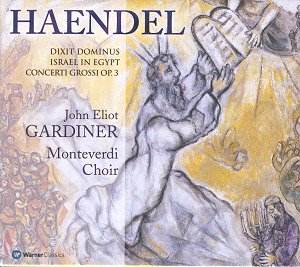The music of George
Frideric Handel has accompanied John
Eliot Gardiner throughout his career.
Many operas, oratorios and other vocal
works as well as music for orchestra
have been recorded by him since the
1970s. Warner Classics has reissued
some of these in this box. It is a strangely
mixed package, which seems to be put
together haphazardly. What is the connection
between the Concerti grossi opus 3 and
the vocal items? It seems to me a rather
unhappy decision to put together recordings
which are stylistically so different:
the concerti grossi are played on period
instruments, whereas the vocal items
are performed with the Monteverdi Orchestra,
which uses modern instruments.
A box with the vocal
items only would have made much more
sense, as in all of them the choir plays
the main role. The fact that the oratorio
Israel in Egypt mainly consists
of choruses was one of the reasons the
first performance in 1739 failed to
captivate audiences. Originally it was
written in three parts, but for the
second performance Handel dropped the
first part. It is the revised two-part
version which is most often recorded
nowadays, and that is how it is performed
here.
The first part is very
dramatic in its vivid description of
the exodus of the Jews from Egypt. The
texts are mainly from the book of Exodus
as well as Psalms 105 and 106. In the
orchestral parts Handel illustrates
the plagues which afflict the Egyptian
people. The second part, Moses' song,
is a setting of the song Moses wrote
and sang after he had led his people
through the Red Sea and after the Egyptian
army had been swallowed up by the waters.
I wonder if John Eliot
Gardiner would be very happy with the
reissue of his recording of Israel
in Egypt, in particular since he
has recorded it again later with the
English Baroque Soloists on period instruments.
It has to be said, though, that the
use of modern instruments in his first
recording is not the main problem. It
is rather the lack of drama which makes
it difficult to see how this performance
could compete with more recent recordings.
Some choruses are done pretty well,
but others are tame, and the illustration
of the plagues in the instrumental parts
is seldom fully explored by the orchestra.
Among the soloists only the tenors and
basses are worth listening to. The sopranos
are weak and produce an old-fashioned
wobble, whereas the altos are too colourless.
The original first
part of Israel in Egypt, 'The
Lamentation of the Israelites for the
death of Joseph', was an adaptation
of the Funeral Anthem for Queen Caroline,
'The Ways of Zion do mourn', which Handel
composed in 1737. This is a lament on
the death of Queen Caroline on texts
from the Bible, in particular the book
of Job and the Lamentations of Jeremiah.
The performance of this piece is a good
deal better than that of Israel in Egypt,
also because the four soloists are much
more stylish. Since the oratorio in
its two-part version starts with a recitative,
Gardiner used the Sinfonia from the
Funeral Anthem as an overture, which
means that in this set we hear that
overture twice.
During his stay in
Italy Handel had already composed a
sacred piece which consisted mainly
of brilliant and technically demanding
choral sections, with relatively small
parts for solo voices. The performance
is simply outclassed by more recent
interpretations. Some of the soloists
are not acceptable any more, in particular
Felicity Palmer and John Angelo Messana.
The use of modern concert pitch creates
a problem for one of the solo tenors.
Old-fashioned traits are apparent. These
include the tendency to sing and play
staccato, which doesn't appear only
here, but also in Israel in Egypt, and
in the Coronation Anthem 'Zadok the
Priest'. The latter's tempo is far too
slow, which seriously damages its otherwise
overwhelming impact.
The last item in this
box is the set of six concerti grossi,
which was published as opus 3. These
recordings are made about four years
later than the vocal items, but the
difference is huge. This recording is
still worth listening to, even though
some more recent interpretations may
be preferable. One year earlier than
Gardiner Nikolaus Harnoncourt recorded
the same set with his Concentus musicus
Wien. On the whole that recording is
more colourful and richer in contrast.
The Concerto No. 6
consists of only two movements, but
since the last movement contains a part
for obbligato organ it is assumed the
organist should improvise between the
two movements, as Handel practised himself
in his organ concertos. Alastair Ross
doesn't do much else than playing chords
and scales up - and downwards, whereas
in Harnoncourt's recording Herbert Tachezi
comes up with a more imaginative and
idiomatic improvisation.
In short, I can't see
a market for this box, since most performances
are surpassed by more recent ones.
Johan van Veen







